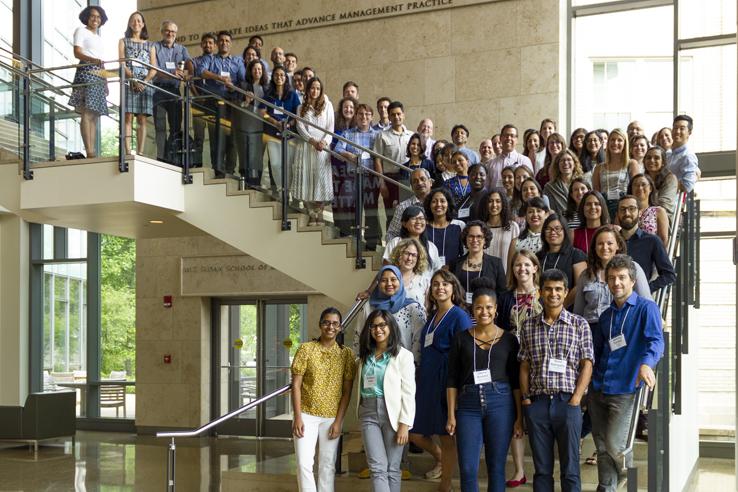May 2021 Newsletter

Improving diversity, equity, and inclusion at J-PAL
Improving diversity, equity, and inclusion (DEI) of our research network, staff, and leadership has been a key priority for J-PAL for many years. It is a goal that we believe very strongly in, as we recognize the biases that exist in our work and the value that a diverse group of people can bring to an organization dedicated to improving the lives of people around the world. During the past year, we have had many conversations about what we may be doing well, where we are failing, and what more we need to do. Read more »
J-PAL alumni changing government systems from within
Careers in government can offer an unparalleled opportunity to improve lives on a large scale. To this end, many former J-PAL staff have gone on to hold positions in governments worldwide, where they work to both rigorously evaluate programs and shape evidence-informed policies. Through a series of interviews, we spotlight our alumni in government who are leveraging evidence in policymaking and implementation. Read more »
Celebrating Earth Day with evidence-informed innovations
Earth Day 2021 presented an opportunity to take stock of the state of our planet, our progress in confronting climate change, and the disproportionate impact of climate change on people living in poverty. On the J-PAL blog, we reviewed evidence on solutions to help address climate change and increase resilience. Read more »
We also released a short video highlighting how the King Climate Action Initiative generates evidence and catalyzes the scale-up of high-impact policy solutions at the nexus of climate change and poverty alleviation. Watch the video »
Learn about J-PAL’s response to Covid-19
FEATURED EVALUATION SUMMARY
Selecting the most effective nudge: Evidence from a large-scale evaluation on immunization in India
More than two million children around the world die each year from vaccine-preventable diseases. Since the start of the Covid-19 pandemic, child immunization rates have fallen drastically. From 2016–2018, J-PAL affiliated professors and coauthors worked with the state government of Haryana, India, to evaluate the impact of three policy tools to increase demand for immunization. They found that a combination of local immunization “ambassadors” selected by the community, small incentives, and SMS reminders to caregivers increased measles vaccinations by 55 percent. Read more »
FEATURED POLICY INSIGHT
Strategies to increase health insurance enrollment
In recent decades, there has been a growing trend toward government-run health insurance and universal health care coverage. However, demand for health insurance coverage is low in many contexts. A review of eleven randomized evaluations in ten primarily low- and middle-income countries showed that reducing health insurance costs or increasing awareness of benefits can increase enrollment. Read more »
FEATURED EVENTS
[Webinar recording] Rich Remote Data: How to Run Your Social Science Research from Afar
Speakers from the Busara Center for Behavioral Economics, IDInsight, Innovations for Poverty Action, and J‑PAL presented emerging findings on remote data collection. Watch the recording »
[Webinar recording] Who Delivers Justice? Evidence for Strengthening Dispute Resolution Systems
During the third webinar of the Governance, Crime, and Conflict Initiative series, panelists discussed the trade-offs between competing formal and informal dispute resolution systems and recent evaluations on building trust in and access to state justice provision. Watch the recording »
FEATURED TRAININGS
Enroll in J-PAL’s Evaluating Social Programs course
How do you know if your organization’s programs are achieving their intended impact? Join one of our upcoming online Evaluating Social Programs courses to learn how randomized evaluations can be used to rigorously measure social impact and shape evidence-informed policies and programs.
Enroll in our free, self-paced version of Evaluating Social Programs by May 14. Learn more and register »
Apply for J-PAL Africa’s Evaluating Social Programs course, held live over Zoom on August 9–13. Learn more and apply »
We will announce upcoming dates in other time zones later this year.
Enroll now in the MicroMasters summer semester
The next semester of our online MicroMasters in Data, Economics, and Development Policy (DEDP) begins June 1. Our classes cover a range of topics and skills: learn the statistical program R while building a strong foundation in probability and statistics in Data Analysis for Social Scientists; get an introduction to microeconomic theory, together with real-world research results and policy implications in Microeconomics; and learn how to use economic theory and data analysis to design and implement effective policy in Foundations of Development Policy. Students who complete the full DEDP credential are eligible to apply for the Master’s program in DEDP at MIT. Learn more and register »
MEDIA HIGHLIGHTS
India’s problem is now the world’s problem [Opinion]
New York Times
Celebrities are endorsing Covid vaccines. Does it help?
New York Times
Can doubling down on basic skills rescue left-behind children?
Financial Times
A breath of fresh air: New J-PAL initiative zeros in on climate impacts in vulnerable regions
Spectrum
How politics is shaping Biden’s infrastructure proposal
The Washington Post
NEW RESEARCH PAPERS
Correcting Perceived Social Distancing Norms to Combat COVID-19
James Allen IV, Arlete Mahumane, James Riddell IV, Tanya Rosenblat, Dean Yang, Hang Yu
The Challenges of Universal Health Insurance in Developing Countries: Experimental Evidence from Indonesia’s National Health Insurance
Abhijit Banerjee, Amy Finkelstein, Rema Hanna, Benjamin A. Olken, Arianna Ornaghi, Sudarno Sumarto
Efficiency and Equity Impacts of Energy Subsidies
Robert W. Hahn, Robert D. Metcalfe
Stigma and Take-Up of Labor Market Assistance: Evidence from Three Experiments
Adam Osman, Jamin D. Speer